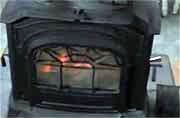- 8 Ways to Increase Dopamine Naturally
- 7 Best Breads for Maintaining Stable Blood Sugar
- Gelatin vs. Collagen: Which is Best for Skin, Nails, and Joints?
- The Long-Term Effects of Daily Turmeric Supplements on Liver Health
- Could Your Grocery Store Meat Be Causing Recurring UTIs?
- Are You Making This Expensive Thermostat Error This Winter?
- Recognizing the Signs of Hypothyroidism
- 10 Strategies to Overcome Insomnia
- Could Artificial Sweeteners Be Aging the Brain Faster?
- Techniques for Soothing Your Nervous System
Prevent Home Heating From Becoming a Safety Hazard


Following home-heating safety measures will help keep you and your family safe this winter, experts say.
“Every year, tragically, people are burned, start fires, get an electric shock and even die from carbon monoxide poisoning because they weren’t taking proper precautions,” Dr. Alex Rosenau, president of the American College of Emergency Physicians, said in a college news release.
According to the U.S. Federal Emergency Management Agency, more than 2,500 people die and 12,600 are injured in house fires in the United States each year.
Carbon monoxide poisoning is another big concern in the fall and winter. The odorless and colorless gas can cause sudden illness and even death.
The ACEP offered these safety tips:
- Check all of your home’s smoke detectors and carbon monoxide detectors to see if they are working properly. If they’re battery operated, change the batteries. There should be one of each type of detector on every floor of your home.
- Have a professional inspect your gas furnace at least once a year. A furnace with leaks or cracks could release carbon monoxide into your home or cause a fire.
- If you use a fireplace, have a professional inspect and clean it every year. Keep flammable materials away from the open flame area. Do not burn trash, cardboard boxes or items that may contain chemicals that can poison your home.
- If you use a wood-burning stove, a professional should inspect and clean the chimney each year. Make sure you have a safe perimeter around the stove, which can radiate excessive heat. Place it on a flame-resistant surface and use a screen to keep sparks and hot coals from coming out of the stove. Use safe woods, such as oak, hickory and ash. Avoid pine and cedar.
- Never use an oven or a gas or electric range as a heating source. This poses a fire hazard, as well as releases dangerous fumes such as carbon monoxide.
- Keep a safe perimeter around electric space heaters. Make sure the heater is away from water or flammable items such as curtains, paper, blankets or furniture. Check for faulty wiring that can cause electric shock or fire. Supervise children and pets around space heaters. Turn heaters off before leaving the room or going to sleep.
More information
The Missouri Department of Public Safety has more home-heating safety tips.
Source: HealthDay
Copyright © 2026 HealthDay. All rights reserved.










